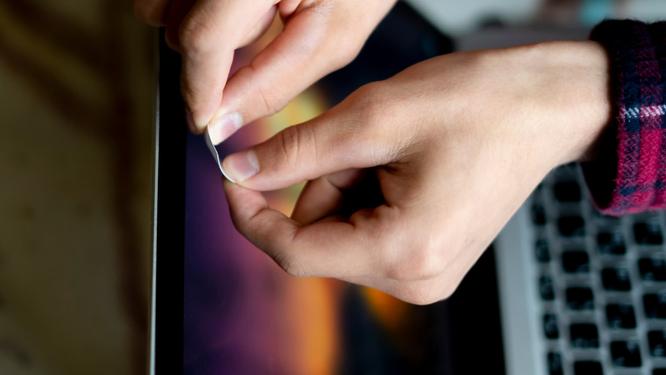By akademiotoelektronik, 29/03/2022
Webcam: the piece of tape to hide it, real or false good idea?
At a time when videoconferences, FaceTime and other Snapchat are now part of our daily lives, webcams and selfie cameras are virtually ubiquitous in homes. Integrated
de facto
on our laptops, electronic tablets and smartphones, they have even become essential both in the professional and personal context, whether to keep in touch with loved ones, more closely than by a simple phone call – confinement will have it well proven – or for budding influencers, who are happy to show off on social networks. But have you ever considered what these little cameras can see (and record) when your back is turned?
Some are already concerned about this question, so you no doubt know at least one person around you who has placed a small piece of tape, a post-it or even a bandage on the webcam of his laptop. Excess of precaution or even pure paranoia, do you think? You don't risk accidentally leaving it on since you never use it, you say to yourself? And at worst, what can happen?
How you can be spied on by your own camera
The problem is that your camera can be hacked. Whether you use it or not, whether you forgot to turn it off or not, potentially any malicious mind can indeed have access to it, via malware that gives him control of the device and thus allows him to record, remotely, a video of you and everything that happens in front of the lens without you having the slightest idea. Do you think you would see it if your webcam suddenly switched on, thanks to the little light that is used to indicate when it is filming? Suffice to say that web pirates know what they are doing, and that they will easily deactivate this LED...
This is how, for the record, a spyware (or spyware in French) called InvisiMole has wreaked havoc for years, working since 2013 without everyone's knowledge until... 2018 ! Capable, among other things, of recording videos and even audio on hacked computers, it entered via a simple attachment sent by email and then remained undetectable. This is also why, we can never say it enough, vigilance is required when faced with emails from unknown senders that contain attached files. The shadow of a doubt ? Don't click on it!

The Mark Zuckerberg example
Okay, but isn't it enough to be careful in this case? And in the event of temporary negligence, isn't it to avoid such inconveniences that antivirus software serves? The thing is that security systems may be improved regularly – hence the importance, by the way, of updates – but there will always be smart guys able to find new flaws. The proof that the threat is indeed real is when the IT specialist par excellence bends himself to this practice, as rudimentary as it is effective, of sticking a small piece of tape on his webcam. We are talking about Mark Zuckerberg.
In a photo he himself published in 2016 to celebrate the 500 million users on Instagram, we indeed see the boss of Facebook (the parent company) at his desk, with his laptop by his side. . And on this one: a small piece of adhesive tape not only on the camera but also on the microphone... If even the little genius from Silicon Valley is suspicious, he who nevertheless manages a company that is not really the most concerned about privacy, shouldn't we do the same? Well, of course, we can imagine that the smallest actions and gestures (and all the more conversations) of Mark Zuckerberg could be worth gold for hackers, which makes him a particular target. But you, who could be interested in your ordinary daily life?
Blackmail on webcam
Well unfortunately, everyone can be perfectly exposed too. Why ? Simply for ransoms. Because while you might not have ultra-sensitive information to divulge, you probably wouldn't like to see a video of you in your most private life either – and not just eating a bowl of cereal. , but you will have understood it – circulate freely on the Web. This is why hackers practice blackmail, sometimes even without actually having such a recording, simply hoping that the victim will not take the risk and pay the ransom...
And the fact is that this practice is more and more widespread in France. According to the annual report of the government platform dedicated to cyber-maliciousness, the victims of what is thus called "webcam blackmail" represented in 2019 no less than 38% of the complaints recorded for cyber-attacks - a global figure of elsewhere seriously on the rise, from 28,000 in 2018 to more than 90,000 last year.
While we obviously have to be on our guard in general on the Web, here is something to think about about this little piece of scotch. Especially given the low investment involved! Note that in addition to laptops, obviously, we must not forget the tablets, they also have a camera which can just as much attract prying eyes if you place the device on a keyboard or even a raised support. ... We can therefore only recommend that you also stick an adhesive strip on the punch of your electric slate.
And for maximum protection, we invite you to discover the SFR Security service: a digital bodyguard guaranteeing secure browsing, protection against data theft and antimalware that protects against malicious applications and software.
On the same subject
What is Cyber Security Month?
10% of Americans use spy apps
3 tips to optimize the security of your smartphone
Sources:
01 Net, New York Times, Cybermalveillance.gouv.fr, 20 Minutes
Related Articles